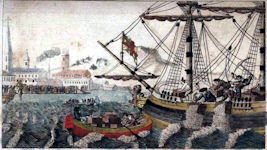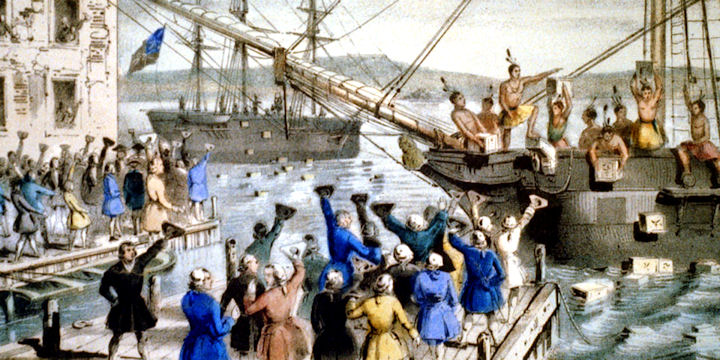1773 - The Boston Tea Party
 The Boston Tea Party is sometimes called the first deliberate act of colonial resistance to British authority. At issue was the predisposition of the crown to pass laws and levy taxes without the consent of the colonists. After the repeal of the Townsend Acts in March 1770, the colonies were freed from duty on all commodities except tea. To counteract smuggling and help move burgeoning supplies, the 1773 Tea Act was enacted. Despite the low price, even with the duty, the rift over the Parliament's right to tax, and ultimately its right to govern the colonies directly, grew.
The Boston Tea Party is sometimes called the first deliberate act of colonial resistance to British authority. At issue was the predisposition of the crown to pass laws and levy taxes without the consent of the colonists. After the repeal of the Townsend Acts in March 1770, the colonies were freed from duty on all commodities except tea. To counteract smuggling and help move burgeoning supplies, the 1773 Tea Act was enacted. Despite the low price, even with the duty, the rift over the Parliament's right to tax, and ultimately its right to govern the colonies directly, grew.
During a three-year interval of calm, a relatively small number of radicals strove energetically to keep the controversy alive. They contended that payment of the tax constituted an acceptance of the principle that Parliament had the right to rule over the colonies. They feared that at any time in the future, the principle of parliamentary rule might be applied with devastating effect on all colonial liberties.
The radicals’ most effective leader was Samuel Adams of Massachusetts, who toiled tirelessly for a single end: independence. From the time he graduated from Harvard College in 1743, Adams was a public servant in some capacity — inspector of chimneys, tax-collector, and moderator of town meetings. A consistent failure in business, he was shrewd and able in politics, with the New England town meeting his theater of action. Adams wanted to free people from their awe of social and political superiors, make them aware of their own power and importance, and thus arouse them to action. Toward these objectives, he published articles in newspapers and made speeches in town meetings, instigating resolutions that appealed to the colonists’ democratic impulses.
In 1772 he induced the Boston town meeting to select a “Committee of Correspondence” to state the rights and grievances of the colonists. The committee opposed a British decision to pay the salaries of judges from customs revenues; it feared that the judges would no longer be dependent on the legislature for their incomes and thus no longer accountable to it, thereby leading to the emergence of “a despotic form of government.” The committee communicated with other towns on this matter and requested them to draft replies. Committees were set up in virtually all the colonies, and out of them grew a base of effective revolutionary organizations. Still, Adams did not have enough fuel to set a fire.
In 1773, however, Britain furnished Adams and his allies with an incendiary issue. The powerful East India Company, finding itself in critical financial straits, appealed to the British government, which granted it a monopoly on all tea exported to the colonies. The government also permitted the East India Company to supply retailers directly, bypassing colonial wholesalers.
By then, most of the tea consumed in America was imported illegally, duty-free. By selling its tea through its own agents at a price well under the customary one, the East India Company made smuggling unprofitable and threatened to eliminate the independent colonial merchants. Aroused not only by the loss of the tea trade but also by the monopolistic practice involved, colonial traders joined the radicals agitating for independence.
In ports up and down the Atlantic coast, agents of the East India Company were forced to resign. New shipments of tea were either returned to England or warehoused. In Boston, however, the agents defied the colonists; with the support of the royal governor, they made preparations to land incoming cargoes regardless of opposition.
On December 16, 1773, three vessels of the East India Tea Company, who had been waiting for twenty days to unload, were barred from returning to Britain by customs officials, despite repeated requests for repeal of the taxes. Approximately 116 men, encouraged by Samuel Adams, John Hancock, Joseph Warren and Paul Revere, some disguised as Mohawk Indians, boarded the ships and quietly and efficiently spilled 342 casks, or 45 tons, of tea into Boston Harbor. They met no resistance. Doubting their countrymen’s commitment to principle, they feared that if the tea were landed, colonists would actually purchase the tea and pay the tax.
A crisis now confronted Britain. The East India Company had carried out a parliamentary statute. If the destruction of the tea went unpunished, Parliament would admit to the world that it had no control over the colonies. Official opinion in Britain almost unanimously condemned the Boston Tea Party as an act of vandalism and advocated legal measures to bring the insurgent colonists into line.
Parliament was swift to act, and passed the Intolerable Acts and closed the Port of Boston. This cut the city off from all commerce, and systems of government and justice were altered, with any remaining liberties stripped away. Rather than isolating the colonies, however, news spread, enraging the citizens of other east coast cities who could see themselves as victims of such measures. In response, the First Continental Congress was created.

|
NEWSLETTER
|
| Join the GlobalSecurity.org mailing list |
|
|
|

